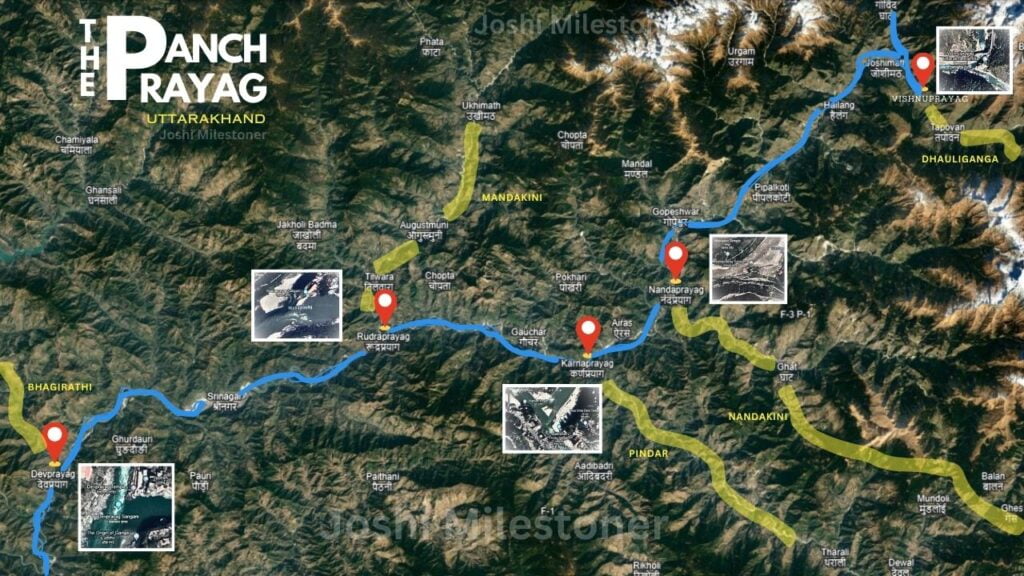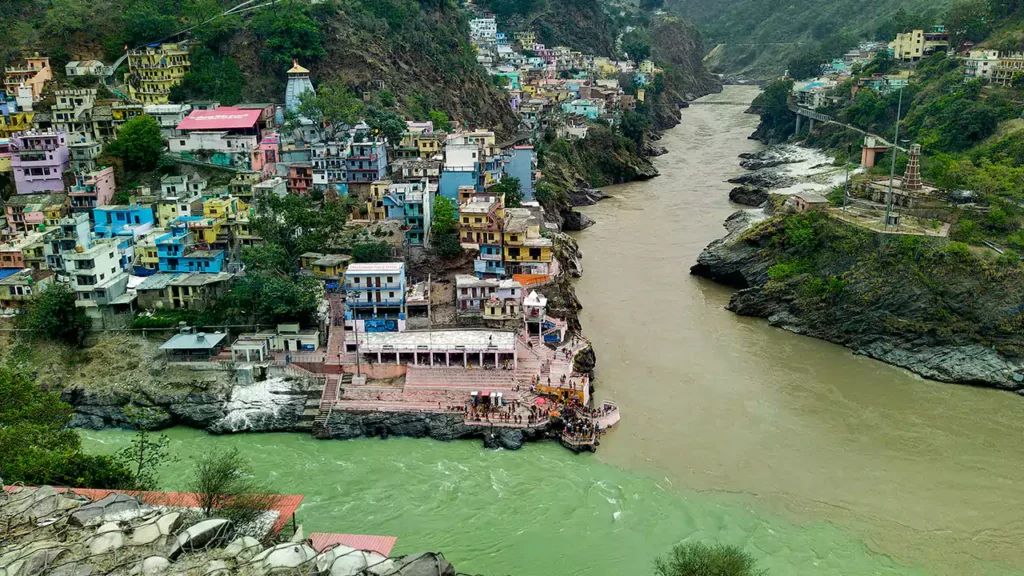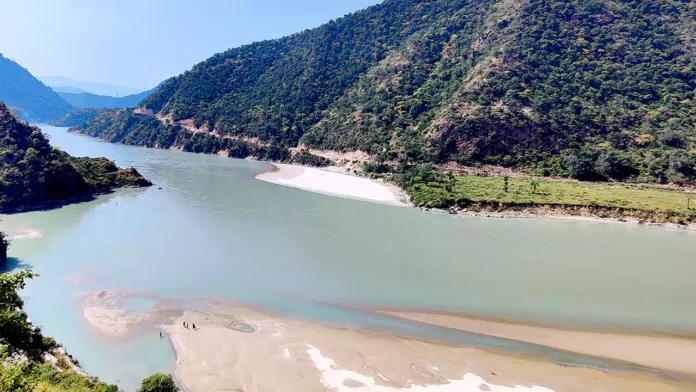In Hindu mythology, rivers hold immense significance. The Panch Prayag in Uttarakhand are an integral part of this sacred connection between land and water situated amidst the majestic Himalayas, these Prayags offer a spiritual journey like no other.
In this blog, we will take you on an exploration of Vishnuprayag, Nandaprayag, Karnaprayag, Rudraprayag, and Devprayag.
We’ll delve into their histories and mythologies, share tips on how to reach them and highlight the must-see attractions around each location.

Download the pdf format of Panch Prayag map Click Here.
Table of Contents
What is the significance of Prayags?
Prayag is the confluence of two or more rivers, and it is considered a sacred site where spiritual energy is believed to be heightened. These prayags are often associated with important religious events and legends, making them revered and deeply fascinating for pilgrims and travelers alike.
In the Sanskrit language, Prayag is also known as “Sangam.”
The Five Prayags in Uttarakhand
Along the Alaknanada river in Uttarakhand, you will find the five sacred confluences, known as the prayags. Each Prayag has its unique history and significance, immersing visitors in a profound spiritual experience.
- Vishnuprayag
- Nandaprayag
- Karnaprayag
- Rudraprayag
- Devprayag
1) Exploring Vishnuprayag
Vishnuprayag is the first confluence. It is here that the Alaknanda River merges with the Dhauliganga River. The temple dedicated to Lord Vishnu stands proudly, inviting devotees to seek blessings and immerse themselves in the divine aura.
- Location: Chamoli district of Uttarakhand, India.
- Rivers: Dhauli ganga and Alaknanda rivers meet at Vishnuprayag.
- Altitude: Vishnuprayag is located at an altitude of 1,372 meters (4,500 feet) above sea level.
- Significance: Vishnuprayag is the first of the Panch Prayags, and it is dedicated to Lord Vishnu. It is believed that taking a dip in the waters of Vishnuprayag washes away sins and brings moksha (liberation).
- Temple: The Vishnuprayag Temple is dedicated to Lord Vishnu. It is a beautiful temple with a white marble shikhara (spire).
2) Nandaprayag
Nandaprayag, where the Alaknanda and Nandakini rivers merge, holds immense religious significance. Named after King Nanda, Lord Krishna’s foster father, it’s a must-visit on the Panch Prayag yatra. The serene Niti Valley offers breathtaking views and attracts pilgrims and tourists.
- Location: Chamoli district of Uttarakhand, India.
- Rivers: The Nandakini and Alaknanda rivers meet at Nandaprayag.
- Altitude: Nandaprayag is located at an altitude of 1,358 meters (4,455 feet) above sea level.
- Temple: Gopalji Temple and Chandika Temple are the prominent holy shrines in Nandaprayag.
3) Discovering Karnaprayag
Its name, derived from the Karna of Mahabharata, adds to its historical significance. A sacred stop on the Panch Prayag yatra, it attracts spiritual seekers and devotees, offering a serene ambiance. Renowned for its religious value, Karnaprayag entices pilgrims and adventure enthusiasts alike.
- Location: Chamoli district of Uttarakhand, India.
- Rivers: The Alaknanda and Pindar rivers (from Pindar Glacier) meet at Karnaprayag.
- Altitude: Karnaprayag is located at an altitude of 1,320 meters (4,330 feet) above sea level.
- Significance: Karnaprayag is the third of the Panch Prayags, and it is associated with Karna, the tragic hero of the Mahabharata. Legend has it that Karna worshipped lord Surya, the Sun God, here to gain the power to pierce his enemies’ armor.
- Temple: The Karnaprayag Temple is dedicated to Karna. It is a small temple located on the banks of the Alaknanda River.
4) Visit to Rudraprayag
Rudraprayag is part of the Panch Prayag yatra. It holds a special place due to the confluence of the sacred rivers Alaknanda and Mandakini. This amalgamation creates strong currents, making it a sight for adventure seekers.
According to Hindu mythology, the sage Narada meditated here, adding to its spiritual aura. Rudraprayag’s unique blend of natural beauty and religious significance sets it apart.
- Location: Rudraprayag district of Uttarakhand, India.
- Rivers: The Alaknanda and Mandakini rivers meet at Rudraprayag.
- Altitude: Rudraprayag is located at an altitude of 1,312 meters (4,309 feet) above sea level.
- Significance: Rudraprayag is the fourth of the Panch Prayags, and it is named after Lord Shiva in his fierce form, Rudra. It is believed that taking a dip in the waters of Rudraprayag can cure all ailments and bestow blessings.
- Temple: The Rudraprayag Temple is dedicated to Lord Shiva. It is a beautiful temple located on the banks of the Alaknanda River.
5) The Final Destination – Devprayag
The confluence in Devprayag unites the sacred rivers Alaknanda and Bhagirathi, forming the holy river Ganga, embodying religious significance.
This amalgamation symbolizes the holy union, adding to its religious importance and sanctity. The junction of Alaknanda and Bhagirathi at Devprayag creates the divine Ganga, evoking spiritual reverence and awe.

- Location: Tehri Garhwal district of Uttarakhand, India.
- Rivers: The Alaknanda and Bhagirathi rivers meet at Devprayag.
- Altitude: Devprayag is located at an altitude of 1,038 meters (3,406 feet) above sea level.
- Significance: Devprayag is the fifth and final of the Panch Prayags, and it marks the birth of the holy Ganges River. It is believed that taking a dip in the waters of Devprayag can wash away sins and bring moksha (liberation).
- Temple: The Devprayag Temple is dedicated to Lord Vishnu and other small shrines. It is a beautiful temple located on the banks of the Alaknanda River.
Route to cover all Prayags.
Option 1: Following the Alaknanda River (Recommended for first-time visitors)
- Start in Rishikesh: This popular pilgrimage town serves as a gateway to the Himalayas and offers numerous temples, Ashrams, and yoga retreats. Explore Rishikesh for a day or two before commencing your journey.
- Devprayag: Head north toward Devprayag, the confluence of the Alaknanda and Bhagirathi, marking the birth of the sacred Ganges. Spend some time at the temples and bathe in the holy waters.
- Rudraprayag: Continue upstream to Rudraprayag, where the Alaknanda meets the Mandakini. Visit the Rudraprayag temple and enjoy the scenic beauty of the valley.
- Karnaprayag: Travel further on the Alaknanda to reach Karnaprayag, associated with the epic warrior Karna. Explore the Karnaprayag temple and savor the panoramic views.
- Nandaprayag: Ascend the Alaknanda to Nandaprayag, dedicated to Nanda Devi, the consort of Lord Shiva. Take a dip in the confluence and visit the Nanda Devi temple.
- Vishnuprayag: Finally, reach the highest and most remote confluence, Vishnuprayag, dedicated to Lord Vishnu. Immerse yourself in the spiritual atmosphere and offer prayers at the Vishnu temple.
Option 2: Starting from Joshimath (Shorter distance)
- Start in Joshimath: This winter pilgrimage destination also acts as a base for visiting Badrinath. Spend a day in Joshimath, acclimatize to the higher altitude, and explore the Narsingh temple.
- Vishnuprayag: Drive directly to Vishnuprayag, the furthest confluence. Follow the Dhauliganga River from Joshimath to reach the sacred meeting point.
- Nandaprayag: Retrace your steps back to Joshimath and then head downstream on the Alaknanda to reach Nandaprayag.
- Karnaprayag: Continue downstream to Karnaprayag, enjoying the changing landscapes and picturesque villages.
- Rudraprayag: Travel further down the Alaknanda to reach Rudraprayag, known for its spiritual significance and stunning scenery.
- Devprayag: Finally, descend to Devprayag, the birthplace of the Ganges. Experience the vibrant town and immerse yourself in the holy waters.
Additional Tips:
- Transportation: Buses and shared taxis are readily available between all five confluences.
- Accommodation: Options range from budget guest houses and dharamshalas to luxurious hotels. Pre-booking is recommended during peak season.
- Road conditions: Mountain roads can be narrow and winding, be cautious.
- Respect local customs and traditions.
Frequently Asked Questions
What are the Panch Prayags of Uttarakhand?
The Panch Prayag of Uttarakhand are the five sacred river confluences in the region. They include Vishnuprayag, Nandaprayag, Karnaprayag, Rudraprayag, and Devprayag. Each prayag holds its significance and is steeped in mythology. A spiritual journey to these prayags is believed to bring inner peace and cleanse the soul.
Is Devprayag and Rudraprayag same?
Devprayag and Rudraprayag are not the same. While Devprayag is where the Alaknanda and Bhagirathi rivers merge to form the Ganges, Rudraprayag is the confluence of the River Alaknanda and Mandakini rivers. Both have significant religious importance in Hinduism.
How many Sangam are there in Uttarakhand?
In Uttarakhand, there are five Sangams, also known as Panch Prayag. These holy confluences include Dev Prayag, Rudraprayag, Karnaprayag, Nandaprayag, and Vishnu Prayag. Each Sangam is located at the meeting point of two or more rivers and holds great spiritual significance for Hindus.
How far is Haridwar from Panch Prayag?
Haridwar is located approximately 280 km away from Panch Prayag, which includes Devprayag, Rudraprayag, Karnaprayag, Nandprayag, and Vishnuprayag. These sacred confluences in Uttarakhand attract numerous pilgrims each year. To reach Panch Prayag from Haridwar, visitors can opt for a taxi or take a bus.
What is Panch Prayag, and how do you visit?
Panch Prayag refers to the five sacred confluences of rivers in Uttarakhand. These include Devprayag, Rudraprayag, Karnaprayag, Nandaprayag, and Vishnuprayag. To visit these Prayags, one can hire a taxi or take a bus from Rishikesh or Haridwar. The best time to visit is during May-June and September-October.
How many ‘Prayag’ are in between Rishikesh & Badrinath?
There are five ‘Prayag’ in between Rishikesh and Badrinath. Starting with Devprayag, followed by Rudraprayag, Karnaprayag, Nandprayag, and Vishnuprayag. Each Prayag holds its significance and has a rich history in Hindu mythology. Many devotees consider visiting all five Prayags as a sacred journey.
Are prayags part of Char-Dham Yatra?
Yes, the prayags are an integral part of the Char-Dham Yatra in Uttarakhand. The Char Dham Yatra involves visiting four sacred destinations – Yamunotri, Gangotri, Kedarnath, and Badrinath. Along the way, pilgrims also visit the five prayags, namely Devprayag, Rudraprayag, Karnaprayag, Nandprayag, and Vishnuprayag.
Conclusion
To summarize, the spiritual journey through the five Prayags in Uttarakhand is a truly enriching experience.
Each Prayag holds its significance and offers a unique blend of history, mythology, and natural beauty.
From the divine confluence of rivers at Vishnuprayag to the serene atmosphere of Nandaprayag, the journey is filled with awe-inspiring moments. Karnaprayag and Rudraprayag offer their tales of spirituality and charm, while Devprayag stands as the final destination, where the rivers merge to form the holy Ganges.
Embark on this spiritual journey and immerse yourself in the divine energy and tranquility that these Prayags offer.
Articles for you on Spiritual Journey
- Char Dham Yatra: Spiritual Journey of a Lifetime
- 12 Jyotirlingas in India – Sacred Shrines of Lord Shiva
- Panch Kailash – Sacred Spiritual Journey to 5 Kailash Peaks
- Panch Kedar: The 5 Sacred Shrines of Shiva
- Kasar Devi – Uttarakhand Meditation Hub UK01
- A Guide to the Panch Prayag of Uttarakhand
- Golu Devta: The God of Justice, Uttarakhand
- Ancient Vridh Kedar (Old Kedar ) Shiva Temple
- Jhula Devi Mata Temple, Ranikhet
- Ram Mandir Ayodhya – Complete Guide 2024
- Ram Lalla and Ram Mandir Ayodhya 2024
- Shrikhand Mahadev Yatra Registration: Your Comprehensive Guide
- Kainchi Dham Ashram Uttarakhand: Neem Karoli Baba Sacred Abode
- Kamakhya Temple, Guwahati: A Mystical World Of Tantra
- Rudranath Temple: Fourth Kedar In Uttarakhand
- Girija Devi Temple – Ramnagar, Uttarakhand UK19
- Uttarakhand Ancient Vridh Kedar – Shiv Temple
Joshi Milestoner is a website working continuously to deliver the best on travel, adventure and airports & aviation. Do not forget to read our blogs and for any queries you can write to us our team will be happy to help you.
Get notified of our blog post via email by subscribing to our Newsletter with the link provided below and do consider subscribing our YouTube channel (Joshi Milestoner) too for more you can follow us on Google News.

Affiliate Disclosure / Disclaimer: Blog Post on our website may contain affiliate links/ Banner. By Clicking and by purchasing the commission can be earned by us (at no extra cost to you) if you purchase anything through the links provided on this website.


